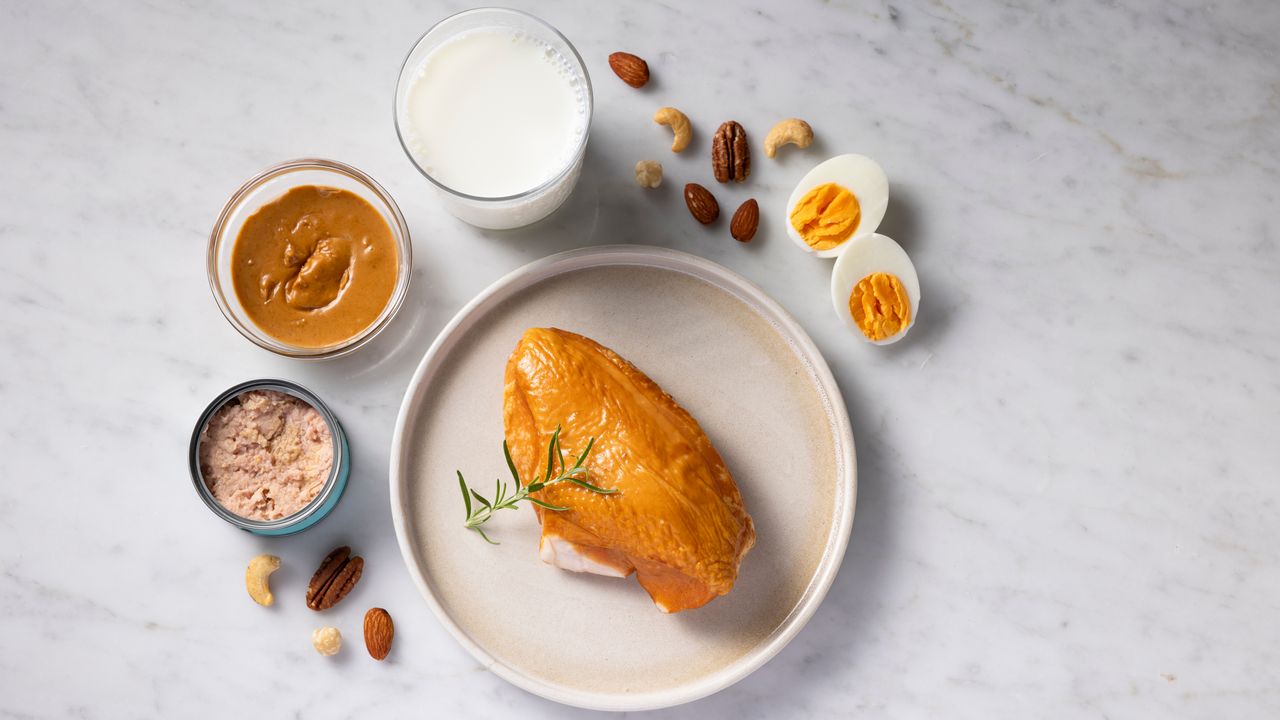Contrary to what you may have heard, eggs are not the be-all-end-all source of protein. Yes, a single, humble egg does offer a whopping 6 grams of protein, but many plant and animal alternatives provide significantly more protein per 100 grams—and sometimes, a more robust nutrient profile, too. Since eggs have around 12 grams of protein per 100 grams (two large eggs are equal to about 100 grams), we’ll be comparing protein per 100 grams for each of the following foods so that you have all the info you need to create a high-protein diet filled with variety.
Protein-Rich Alternatives to Eggs
Peanuts
Whether you like them raw, roasted, or in the form of “butter,” peanuts are a great source of protein. Coming in at about 25 grams per 100 grams, the humble legume is actually more protein-dense than a steak. It’s also a versatile addition to any dish: Mix peanuts into breakfast smoothies or oatmeal, or sprinkle on salads and stir fries.
Tofu
Don‘t sleep on soy: 3.5 ounces of firm tofu contains around 20 grams of protein. It’s also easy to cook and a good source of calcium, iron, magnesium, and potassium, as well as B vitamins.
Greek yogurt
Plain, non-fat Greek yogurt has 10 grams of protein per 100 grams, but as most single-serving Greek yogurt cups are around 170 grams, you’re probably getting more—anywhere from 16 to 20 grams. Due to the natural fermentation process, Greek yogurt is also a great option for people who are lactose-sensitive. Plus it’s filled with probiotics. Win-win-win.
Quinoa
Quinoa is considered a vegetarian-friendly complete protein—a.ka. a protein that contains all nine of the essential amino acids that are integral for metabolism, cognitive function, and immunity. Quinoa contains approximately 14 grams of protein per 100 grams.
Cottage cheese
Call it the comeback kid—cottage cheese is cool again. Its nutritional stats prove its worth: Cottage cheese contains around 13 grams of protein per 100 grams. Plus, it has the added bonus of a huge amount of calcium. Look for cultured cottage cheese to get an extra dose of probiotics.
Lupin beans
This traditional Mediterranean legume isn’t widely consumed in the United States… but its definitely a food we should all be eating more of. The plant-based protein comes with a lot of fiber, and makes pretty tasty snack, similar to edamame. Not to mention: Lupin beans have an impressive 42 grams a protein per 100 grams.
Parmesan
With a whopping 38 grams of protein per 100 grams, Parmesan is the undisputed leader among cheeses when it comes to protein—just remember, it does have a relatively high salt and fat content. Regardless, this cheese is a complete milk protein and has a particularly high concentration of lysine, an essential amino acid necessary for building muscles, as well as calcium to support strong bones.
Tuna
Tinned fish are really having a moment—just looked to canned tun, which has about 27 grams of protein per 100 grams. Other heath benefits include a high level of omega-3 fatty acids.
Chicken or turkey breast
With 24-31 grams of protein per 100 g, the leanest of all meats provides the best ratio of protein to fat. It also has a nice amino acid balance and is easily digestibility by the body, making it ideal for anyone who wants to build or maintain muscle. Whether grilled, roasted, or baked in the oven, chicken and turkey breast are versatile and go with almost anything.
Remember, it is not only pure protein content that determines the quality of a food, but also its biological value, digestibility, flavor, and how well it fits into everyday life. Eating a varied diet does the most good for your health—variety on the plate is the real superfood factor.
Have a beauty or wellness trend you’re curious about? We want to know! Send Vogue’s senior beauty & wellness editor an email at beauty@vogue.com.





